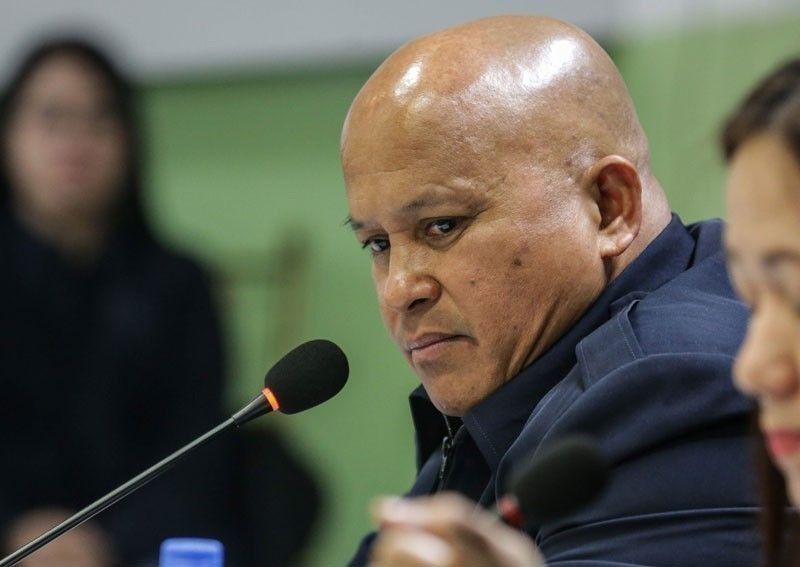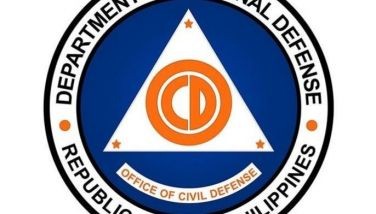Regular neuropsychiatric tests for cops sought

MANILA, Philippines — Regular neuropsychiatric tests and anger management sessions are needed in the Philippine National Police (PNP) to prevent loose cannons in the force, like Master Sergeant Jonel Nuezca, a senator and former PNP chief said yesterday.
Speaking at the Laging Handa briefing, Sen. Ronald dela Rosa also underscored the need for legislative reform to aid the PNP in strengthening its internal disciplinary processes by vesting the PNP chief with more powers.
While referring to Nuezca’s fatal shooting of his neighbors – Sonya Gregorio, 52, and her son Frank Anthony, 25 – in Paniqui, Tarlac last Dec. 20 as an “isolated case,” Dela Rosa said the PNP must improve on keeping its personnel in check as members of a professional organization.
The senator is convinced that subjecting police officers to regular neuropsychiatric tests is a reliable way of preventing another loose cannon within the police force.
“Yes, the neuropsychiatric test is reliable. There is just a need to do it regularly,” said Dela Rosa about
determining whether or not an individual is fit to serve as an armed law enforcer.
The problem is, policemen only undergo neuropsychiatric tests upon recruitment and when applying for schooling or promotion.
“Other than that, there are really no regular neuro tests. So he can enter the police force normally he has no problem but while he is in service, he learned to use drugs, his brain is damaged so his behavior can change,” Dela Rosa said.
He said it should be done as regularly as once a year.
The chairman of the Senate committee on public order and on dangerous drugs also supported the call to have policemen take anger management courses, which he said could have changed Nuezca’s disposition.
“If at that instance, somebody told Nuezca to do debriefing for about five to 10 seconds, his decision-making might have changed. He might not have pulled the trigger. There’s really a need for anger management,” he said.
Dela Rosa also said the PNP chief should have stronger disciplinary powers and vowed to push for this amendment to Republic Act 8551, the law governing the PNP.
“We really have to revisit RA 8551 and strengthen the power, the disciplinary mechanism of the PNP, especially the chief PNP, you really need to have a chief PNP who is fully empowered to discipline his people,” he said.
“Compare the AFP (Armed Forces of the Philippines) with the PNP, their disciplinary mechanism is very different because the soldier, if the military sins, his commander can imprison him immediately. In the PNP, you cannot be detained until there is a case,” he added.
Citing Nuezca’s case as an example, Dela Rosa said the PNP chief should have been empowered to order the policeman’s immediate dismissal from the service because his crime – as captured on video – is obvious.
“But in the PNP, the summary dismissal proceeding, according to the Napolcom (National Police Commission), should take 30 days for them to afford the suspect due process. We really need due process, but that’s dragging,” he said.
Apart from PNP reforms, Dela Rosa renewed his call for the revival of the death penalty, noting that six other senators already filed separate bills seeking the reimposition of capital punishment for heinous crimes.
He said the recent killings involving Nuezca highlighted the need to reimpose capital punishment.
“Deep in my heart, I know that the death penalty should be imposed on Nuezca for the very cold-blooded killing. I didn’t see enough provocation on the part of the victims. What he has done was too much,” the senator said in Filipino.
However, he rejected those weaving the incident into the narrative of a culture of impunity in the PNP, saying these claims come from “critics who want to destroy our government.”
Resolution by mid-January
Yesterday, the PNP’s Internal Affairs Service (IAS) vowed to come up with a resolution for Nuezca’s dismissal by the middle of January next year.
The IAS will start summary dismissal proceedings against Nuezca tomorrow, paving the way for his exclusion from the PNP. The policeman has five days to submit a written reply on his summons.
Barring delays, IAS Inspector General Alfegar Triambulo said the public should expect a draft resolution on Nuezca’s case as early as Jan. 14.
“We will submit a recommendation to the PNP chief for his dismissal by Jan. 19 or 20,” he said in a phone interview.
It will be up to Gen. Debold Sinas, PNP chief, on whether to immediately approve the resolution or subject it to further review by the legal department.
But even if Sinas gives the go signal to their recommendation, Triambulo said it will still take some time before Nuezca is kicked out of the PNP as he is given ten days to appeal after receiving a copy of the decision.
Once his appeal is denied, Nuezca would be dropped from the roster of the PNP and lose his pension and other benefits, except for the commutation of his leave credits.
Nuezca would also be disqualified from holding any other post in government as what he committed is a grave offense.
Triambulo asked for public understanding over the long process mandated by law, saying even though his crime is obvious, “he is presummed innocent until proven guilty.”
‘Nuezca reflects institutional ill’
Meanwhile, lawmakers rebutted the PNP’s claim that Nuezca’s killing of two unarmed civilians was an isolated incident for members of the organization.
Muntinlupa Rep. Ruffy Biazon and Agusan del Norte Lawrence Fortun both urged the PNP leadership not to downplay the killing as it represents a systemic ill in the police force that warranted legislative reforms.
“It may be the methodology and/or curriculum of training, their monitoring of the skills, mental health and discipline or their standard operating procedures or protocols and they should perform an honest to goodness evaluation followed by a determination of the specific reforms they need to do to address the problem,” he said.
Fortun agreed and also pushed for reforms in the PNP.
He cited the proposal to transfer the IAS to the Department of Justice to “help eradicate the plague of police criminality and brutality.”
Biazon also argued that dismissal of the two previous grave misconduct cases involving homicide against Nuezca for lack of substantive evidence also called for reforms in police operational procedures concerning evidence gathering and preservation.
He said the PNP and the Department of the Interior and Local Government (DILG) said these, along with the killing of the Gregorios, are an indication that something is defective in the institution.
He then said that House Bill No. 32, the Body Camera Act, would greatly aid in providing incontrovertible evidence to hold erring law enforcers accountable for their misdeeds or help the PNP disprove false accusations made against police officers.
“I urge my colleagues in the House to begin deliberations and ensure the swift passage of the bill to break the culture of impunity in the country,” he said. – Manny Tupas, Edu Punay
- Latest
- Trending



























